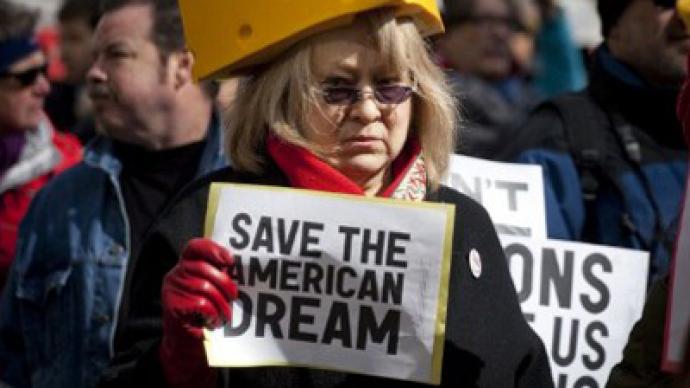Want to pursue the American Dream? Move to Canada or Europe!

Long gone are the days of Cinderella stories in America. Rags-to-riches tales may have at one point been part of the American Dream for those aspiring for success in the states.
New statistics show that moving up the social ladder is no longer a dream as obtainable as before.According to recent studies, the New York Times reveals this week that economic mobility in America is nowhere near as easy to accomplish as in decades past. Instead, immigrants searching for a new chance at prosperity are better off pursuing options in locales as close away as Canada. “It’s becoming conventional wisdom that the US does not have as much mobility as most other advanced countries,” Isabel V. Sawhill of the Brookings Institution tells the Times. “I don’t think you’ll find too many people who will argue with that.”Data from the 2010 Census has previously led analysts to uncover that the inequality gap in America is at its greatest in decades. The middle class has been shrinking in recent years, with more and more Americans finding themselves impoverished or in what the government considers simply “low-income” or poor. Roughly one-in-two Americans fall into those categories, while the richest of the rich in the country see sky-rocketing salaries and bank account receipts. According to recent data from the Congressional Budget Office, the richest one percent of Americans saw their income, adjusted for inflation, balloon up by 275 percent between in 1979 and 2007. Meanwhile, however, the bottom 20 percent of the United States saw their income increase by only a staggering 18 percent.“The bottom fifth in the US looks very different from the bottom fifth in other countries,” researcher Scott Winship of the Brookings Institution adds to the National Review. “Poor Americans have to work their way up from a lower floor.”Staggering unemployment and worsening economic conditions are making the fight one many feel isn’t worth waging. In the month of October, for example, the US economy spawned around 120,000 jobs last month, at the same time, around 315,000 Americans left the labor force — that is, they simply gave up.Although those chosen few are sitting pretty on billions upon billions, for aspiring entrepreneurs with high hopes for the futures, statistics largely allay any aspirations of success. What was once the American dream has been usurped by the United States’ own competitors, and the National Review notes that in terms of climbing the ladder of economic success, “most Western European and English-speaking nations have higher rates of mobility.”As such, the entire notion of the American Dream is being eradicated as a new nightmare emerges of the average everybody being unlikely to rise through the system. Swedish economist Markus Jantti found that 42 percent of males in America that are raised in the bottom 20 percent, income-wise, are destined to remain there for life. In Britain, a nation previously considered a place of stringent class structures, only 30 percent of men find themselves statistically in such restraints. Experts say that the worsening poverty level in America is creating a hole much too large to escape. Only 8 percent of those men in the bottom fifth sector are able to climb to the top of the ranks, while that figure resembles 12 percent in Britain and 14 percent among Danes. Similarly, a separate study carried out by the Economic Mobility Project of the Pew Charitable Trusts reveals that those in the top fifth are 62 percent likely to stay there, and 65 percent from the bottom two-fifths in America will remain in that standing as well.Not even across the pond, people are finding increased chances at bettering their lives only miles away in Canada. To the north, University of Ottawa economist Miles Corak writes in a report that while 16 percent of Canadian men raised in the bottom tenth of incomes will stay there as results, such stays true for 22 percent of Americans. Corak’s study, which required research dating back to 2006, found that through 50 separate studies, economic mobility was greatest in Canada, Norway, Finland and Denmark. America was towards the bottom. “If you put more money into the hands of people, they're going to spend it. And that will create demand, it will create economic growth and it will create jobs,” Moveon.org’s Robert Applebaum told RT recently. Instead, however, the only people in America seeing an increase in income lately are those who have long held the ranks within the top-tier of money makers.Former George W Bush strategist Matthew Dowd added to ABC recently, that the less fortunate “watch Wall Street, government bailouts and feel like the rich play by different rules. They think, 'Here I am, trying to make payments on my house with my own small business, trying to make ends meet, but if I need help, no one will help me.'""They don't feel any ability to move up. They feel stuck and don't feel there's a lottery ticket to take them to a higher class," he adds.














